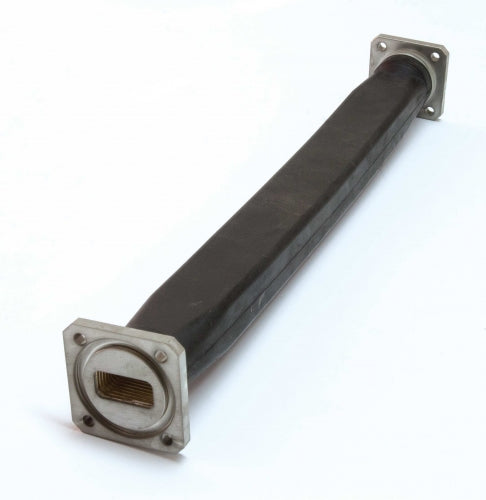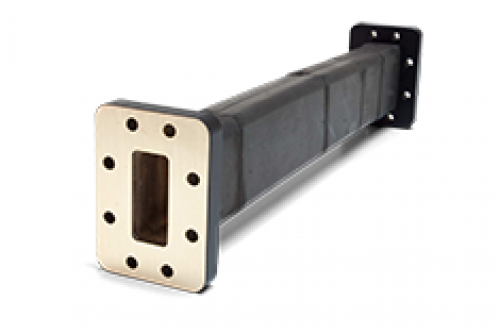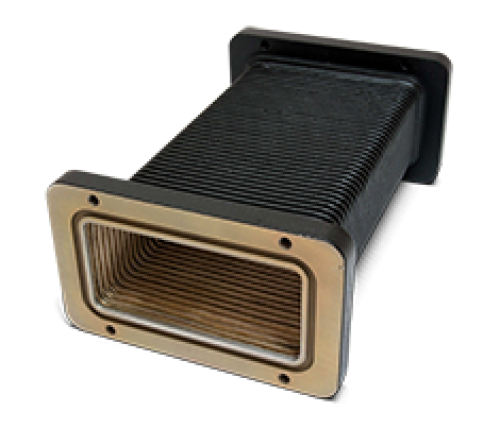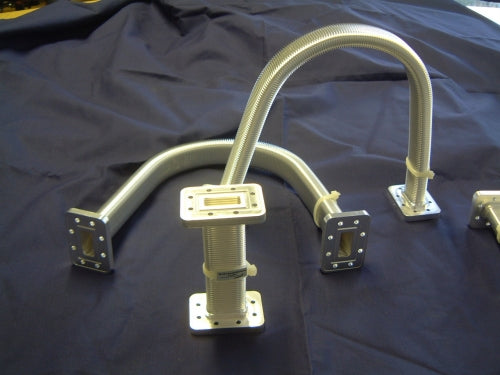We use cookies
This site uses cookies to provide you with a great user experience. You can view our cookies policy here.




Our flexible waveguides are designed to isolate vibration, eliminate installation difficulties caused by misalignment and to provide a simple aid to positioning and alignment of antennas.
Our flexible waveguides are designed to isolate vibration, eliminate installation difficulties caused by misalignment and to provide a simple aid to positioning and alignment of antennas.
Both flexible/twist and flexible only are made from a helically wound waveguide core and additional mechanical support is offered from a variety of protective jackets.
Long lengths (>1m) of flexible waveguide are not recommended as better performance will be obtained from a mixture of rigid waveguide and much shorter flexible sections - see also hybrid waveguides
A preformed waveguide assembly is formed into the desired shape during the manufacturing process. Preforming can reduce the stress on the waveguide and the joints, and it is recommended in waveguides that will be bent close to the minimum static bend radius.
Preforming may be carried out on all GIW Flexible Waveguides and on Side Seam and Seamless waveguides. If a permanent twist is required the GIW Flexible Only Waveguides may be manufactured with a set twist. Preformed waveguides offer a defined and measured electrical performance for the installed shape.
A Hybrid waveguide run can contain both rigid and flexible sections. Flangeless low profile joints offer the following advantages:
Wherever possible formed sections will be used in preference to cast or machined sections to ensure the best possible insertion loss and match specifications.
Both preformed and hybrid waveguides can be supplied on a keeper plate, if required, to maintain the shape during storage / shipping.
In some cases, it is possible to use hot pressure cured rubbers to jacket waveguides that have been preformed, but this will require specific mould tooling. Where this is not desirable a range of cold cure jackets are available.

Hybrid waveguide with preformed flexible section

Preformed flexible waveguides
Flexible / Twistable and Flexible Only core is manufactured by a process of helical winding a silver coated, brass strip to form a continuous, uniform rectangular tube.

Flexible/Twistable is sealed electrically via a friction joint. This construction has the best twistable performance of all our waveguides. The Twistable waveguide will hold limited pressure, but relies on the jacket for pressure sealing. Flex/Twist is not recommended for low PIM applications - use our seamless core.

Flexible Only core is wound with a solder fillet in the Interlock, thus eliminating any RF and Pressure Leakage. Flex/Only will flex in the E and H planes only, although pre-set twists can be incorporated during manufacture. It is more flexible than seamless.

This is manufactured by convoluting and forming a metal tube so it will flex in the E and H planes only. Seamless offers the best PIM performance when used in conjunction with the appropriate flanges.

This is similar in construction to seamless but made from sheet and brazed together.
The table shown below gives the thermal characteristics for the different core types.
As standard, high melting point lead free solder is used to attach the flanges (operating temperature range -55 to +181). Silver solder (operating temperature range -196 to +254) may also be used in some applications.
We offer a range of different protective coverings to suit most requirements.
Neoprene, silicone, and high conductivity silicone jackets are vulcanized to the waveguide using thermal compression techniques and have a high resistance to ozone attack. The jacket provides support to the convolutions during flexing and the pressure seal in Flexible / Twistable waveguides. Neoprene is the standard jackets for our flexible waveguides.

Where preformed flexible waveguides are required or vulcanizing is not viable, we offer a variety of cold cure jackets in both silicone or (Urethane) Devcon.
Enamel or epoxy painting may be offered as an alternative to a moulded jacket if required, but should be offered only after consulting the factory.
When operating at elevated temperatures, care should be taken to ensure that the correct jackets and solders have been requested.
The table shown below gives the thermal characteristics for the different jackets available with our flexible waveguides.
For more details and prices please use the product enquiry form or contact our sales team.
Download the Flex Twist, Flex Only & Seamless Flexible Waveguide (WG10 to WG23 / WR284 to WR22) specifications.
Add your details below to find out more about this product. We'll aim to get back to within 48 working hours.
Choose options

Join Us
Our expert team is available to help you dimension the optimal solutions for your VSAT Terminal and Gateway needs.